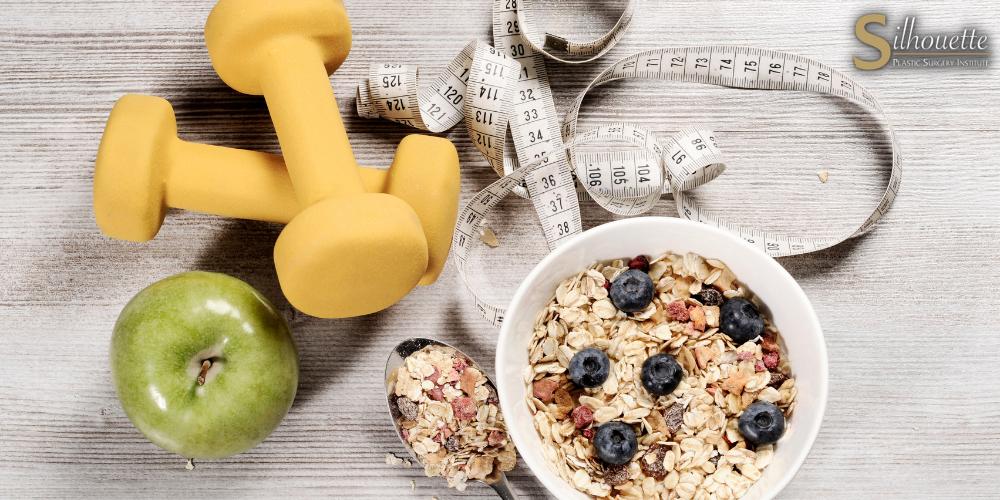Every year, liposuction is considered one of the most popular types of cosmetic surgery in the United States. In fact, 211,067 Americans got liposuction surgery in 2020 according to data from the American Society of Plastic Surgeons. Liposuction is not considered a weight loss procedure, but it can successfully remove pockets of stubborn fat that don’t respond to a healthy lifestyle. One of the potential dangers of liposuction is the semi-permanent results, leading many patients to wonder: what happens if I gain weight after liposuction? Below, board-certified plastic surgeon Dr. Daneshmand addresses this common concern among liposuction patients, and provides tips on how to maintain results.
If you believe you’re a good candidate for liposuction or any other type of cosmetic surgery, call 949-359-8397 to schedule an appointment at Silhouette Plastic Surgery Institute today.
What is Liposuction?
Liposuction is a type of fat removal surgery in which a plastic surgeon inserts a small tube under the skin and sucks out stubborn fat cells in certain areas of the body. The procedure typically ends there, unless the patient has also requested a fat transfer. Then the surgeon will purify the fat cells and inject them into another part of the body, typically the buttocks area. This is known as a Brazilian butt lift (BBL).
The most common areas of the body that treated with liposuction are:
- Cheeks and face
- Chin and neck
- Upper arms
- Abdominal area
- Upper back
- Love handles
- Buttocks
- Inner and outer thighs
Who is a Good Candidate for Liposuction?
You may be a good candidate for a liposuction procedure if you:
- Are at or near your goal weight.
- Don’t actively suffer from an eating disorder and/or body dysmorphia, as these conditions could lead to weight gain after liposuction.
- Have good skin elasticity and muscle tone.
- Have areas of stubborn fat that do not respond to a healthy diet and exercise.
- Don’t smoke.
- Have good overall health and no major conditions or diseases.
- Are not pregnant or planning to be pregnant in the near future.
- Have realistic expectations for your liposuction surgery.
Meanwhile, you may not be a good candidate for liposuction surgery if you:
- Have unrealistic expectations about the procedure, such as that liposuction is a weight loss procedure instead of a body contouring procedure.
- Are severely underweight or overweight.
- Have a major health condition that could make surgery or the healing process dangerous for you.
- Have poor skin quality.
Be sure to schedule an appointment with board-certified plastic surgeon Dr. Daneshmand to determine if you are a good candidate for liposuction.
How Does Liposuction Work?
Before your liposuction procedure begins, your plastic surgeon will sedate you with general anesthesia, so you will be asleep and won’t feel any pain.
Next, your plastic surgeon will make small incisions in the treatment area and insert a small tube, called a cannula, which is attached to a suctioning device. The cannula will be inserted in the space between the skin and muscle, where the subcutaneous fat lies. Next, your surgeon will begin breaking up and removing fat cells from the treatment area. If you have also requested a fat transfer, then the fat removed will be purified and injected elsewhere. Finally, your plastic surgeon will stitch up your incisions and send you to recovery.
Are Liposuction Results Permanent?
Liposuction results are considered semi-permanent because the procedure will permanently remove fat cells from the treated areas. In order to make your liposuction results as permanent as possible, it’s crucial to stay within ten pounds of your ideal weight. Anywhere from five to ten pounds of weight fluctuation on a regular basis is completely normal and will not change your results.

What Happens if I Gain Weight After Liposuction?
One thing that we, as plastic surgeons, stress to our patients is that liposuction is not a weight loss procedure. At most, liposuction patients will lose around five pounds of stubborn fat. Keeping their new contoured shape after the procedure is completely up to them.
If you happen to gain weight after liposuction, you will likely notice it the most in untreated areas of the body first. Liposuction permanently removes fat cells from a specific part of the body, so this means that new fat cells are unlikely to regenerate, and if they do, it will happen over the course of several years. It is very possible for the remaining fat cells in treated areas to expand with weight gain, which will make you lose your liposuction results. However, you likely won’t notice a drastic visual difference unless you gain a significant amount of weight – like 10% of your original body weight.
If you do experience weight gain in the treated area and/or all over the body, you could try liposuction again, or work towards a healthier lifestyle.
How to Avoid Weight Gain After Liposuction
If you’re trying to avoid gaining weight after liposuction or you’re trying to lose weight to get back to that contoured appearance you invested your hard-earned money in, you must follow a healthy lifestyle. This means following a healthy diet and exercise routine, which may sound miserable, but it doesn’t have to be. Keep the following tips in mind if you’re concerned about weight gain after lipo:
- Drink Water: Most Americans do not drink enough water on a daily basis. Increasing your water intake will not only keep you hydrated and feeling good, but will help you keep your weight stable as well.
- Exercise Regularly: Exercise doesn’t have to be intense or miserable. Getting any type of movement in a few times a week is often enough to help you stay within your ideal weight. Walking, yoga, pilates, stretching, and swimming are great options for people who loathe intense exercise in a gym setting.
- Healthy Diet: There are literally countless definitions of a “healthy diet” these days because different diets work for different bodies. You may find that working with a dietician or nutritionist is the best way to find what truly works for you and your body. Again, dieting doesn’t have to be miserable. As long as you don’t grossly exceed your daily caloric intake and you incorporate plenty of fruits, vegetables, whole grains, healthy fats, and lean protein sources, you’ll have a good chance of maintaining your lipo results.
- Reduce Stress: This one is far easier said than done. We live in a stressful world where everything feels hard and overwhelming. But we all must learn how to manage this stress. If not, our bodies will suffer in more ways than one. In times of chronic stress, many people will struggle to maintain healthy eating habits which directly affects their weight. Even if people do maintain the same eating habits during chronic stress, their weight may still fluctuate quite a bit due to changes in hormone levels. A few ways to manage stress include seeing a therapist, journaling, meditating, setting aside time to rest, and doing gentle movement (i.e. yoga or stretching).

Call Silhouette Plastic Surgery Institute Today
If you’re experiencing weight gain after liposuction, you may be due for another liposuction procedure. Dr. Daneshmand at Silhouette Plastic Surgery Institute can listen to your concerns, perform a physical examination, and help you determine what the best options are for your body and situation. Call 949-359-8397 to schedule an appointment at our Bakersfield, CA clinic today.

